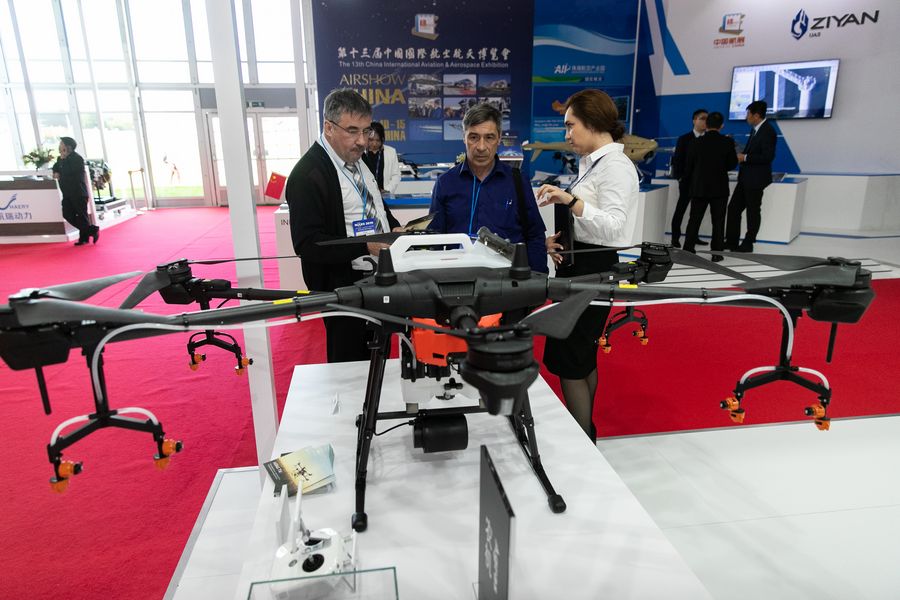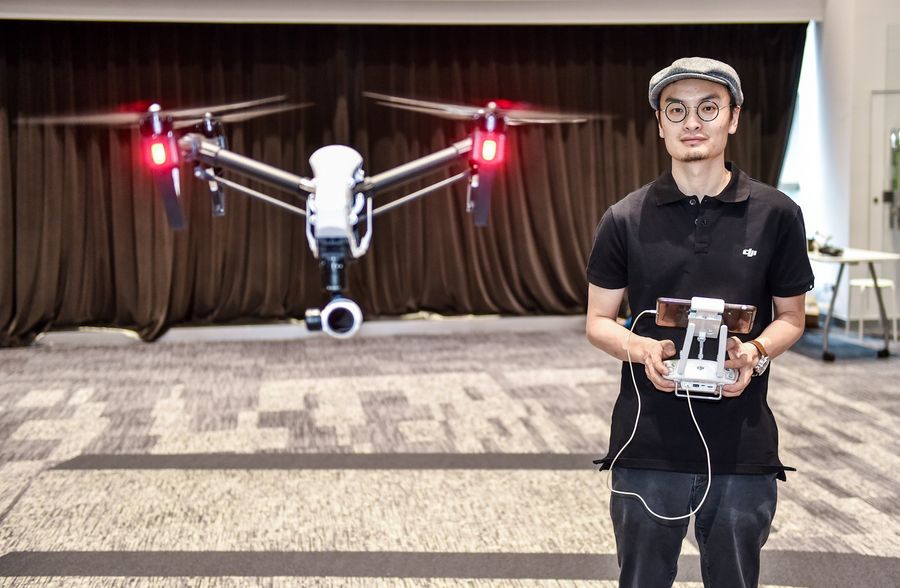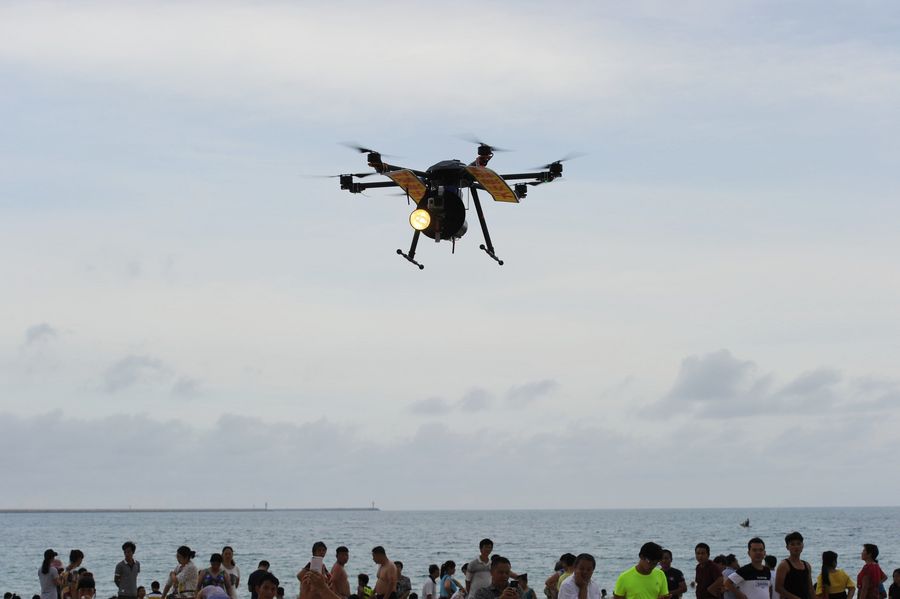
People view DJI agricultural drone during the international aviation and space salon MAKS 2019 in Zhukovsky, Russia, Aug. 27, 2019. (Xinhua/Bai Xueqi)
"DJI is looking for the best technology at the most affordable price."
LOS ANGELES, Sept. 27 (Xinhua) -- The Chinese-made drones are an "incredible story of modern technology," said Benoit Guillot, program director of the French drone company Artelia.
At the AirWorks conference in Los Angeles this week, Guillot recalled his team using three drones to capture the footage of the 850-year-old Notre Dame Cathedral after the devastating fire this April.
The three day event, started Tuesday, is an annual gathering of technology experts and policymakers initiated by Chinese drone maker DJI to drive the commercial drone industry forward.
Guillot's team used Phantom 4, DJI M210 and Mavic Pro thermal, all manufactured by DJI, to map the church's outside and inside vault and the cathedral's 3D shell.

A staff member of major Chinese consumer-drone maker DJI shows Phantom 4, the latest consumer quadcopter camera, at DJI's flagship store in Seoul, capital of South Korea, on March 11, 2016. (Xinhua/Yao Qilin)
They also mapped the ground damage and rubbles when its roof was in danger of collapsing, which saved photographers from taking the risks. Their work will help investigators and architects determine the damages before undertaking the reconstruction.
"Those drones are in good performance and work accurately in every situation," Guillot told Xinhua. "They are all in one package, and very precise and accurate."
Andre Finot, Notre Dame's communication director, said he was blown away by the technology. "It was totally surprising to see them flying so quickly and hovering at this location."
"I realized that it was not just a simple gadget for TV production. It can also be used to save a building like Notre Dame and also save lives," Finot said.
BUILDING AN ECOSYSTEM
The Notre Dame rescue was just one of many stories being told at the three-day event.
The annual conference sponsored by the DJI drew about 700 attendees and offered 60 educational workshops spanning five core industries including agriculture, construction, energy, infrastructure and public safety.
"We have a dialogue with a number of leaders in the industry, public safety, government, commercial businesses, energy transportation companies to have a complete discussion of what is the market today and what's going to be the market tomorrow," said Mario Rebello, DJI's country manager for North America.

Wang Tao, founder of Da-Jiang Innovations (DJI), controls a drone in his company in Shenzhen, south China's Guangdong Province, May 22, 2015. (Xinhua/Mao Siqian)
The drone market is turning into an "ecosystem" in which Shenzhen-based DJI is taking the center stage. According to Skylogic Research, a drone analyst company, the Chinese drone manufacturer holds more than 70 percent of the worldwide civil drone market share.
Like Google's Android to app developers, DJI drones are becoming a platform where hundreds of startups and end users with their specific demands applied the drone technology into their own industries.
"They are getting value and now they're helping businesses reduce their costs and actually saving people's lives," said Rebello.
FLIR Systems, a thermal imaging manufacturer based in Oregon, is a partner of DJI. FLIR launched at the conference its first multi-gas detector built for unmanned aerial systems, which is compatible with the DJI M210 and can help first responders to locate and identify chemical gas hazards.
"DJI is looking for the best technology at the most affordable price, so we put our payloads on those most popular airframes," said Chris Bainter, FLIR's global business development director.
At the conference, the Los Angeles Fire Department also showcased how DJI drones were used to conduct aerial mapping for wildfire response and for swift water rescues, hazmat operations and urban search and rescue missions.
"The drone gives customers a tool and then they are developing customized solutions that are software-based or at times they are adding more hardware to our drone," said Rebello.

A rescue drone capable of broadcasting and issuing warnings, patrols above a beach area in Sanya of south China's Hainan Province, May 30, 2017. (Xinhua/Sha Xiaofeng)
DATA SECURITY WITH TRUST
Along with the Chinese drone-maker's rapid expansion, misgivings over data security also loomed. Last week, some U.S. senators launched a bill that may stop the federal government from buying drones from China.
It came after the U.S. Cybersecurity and Infrastructure Security Agency (CISA) warned in May that the Chinese-made drones contain components that collect operation and customer data for intelligence use.
DJI then submitted a letter to the Senate denying speculation about the company's data security practices. According to the letter, DJI drones do not share flight logs, photos or videos, and do not automatically send flight data to China or anywhere else.
Rebello said that one announcement would be far from enough to avert misinformation and dispel security concerns, while emphasizing the willingness of DJI to build trust with its customers.
"We've got to show them that there is no security vulnerability. So what we've done with a number of federal agencies is we've worked with them," Rebello said.
"They tell us what they need, we develop the solution and then they have a third party, a security agency or security expert come into review the software code and the hardware and make sure what we said is true."
Earlier in June, DJI introduced a drone solution for use in high-security situations by government agencies, allowing them to have full control over how the data they generate with the drones will be collected, stored and transmitted.
Rebello pledged to work with industry regulators and DJI's partners and establish security standards that are still lacking in this fledgling industry.
"To prohibit the use of the product just because of the country of origin, or just because we're located in China...is not a validation, not a path forward," said Rebello.
The hardware itself, in Guillot's opinion, should not be considered a threat to data security. "If you want to use a drone for making bad things, you can use it even with a car." ■



